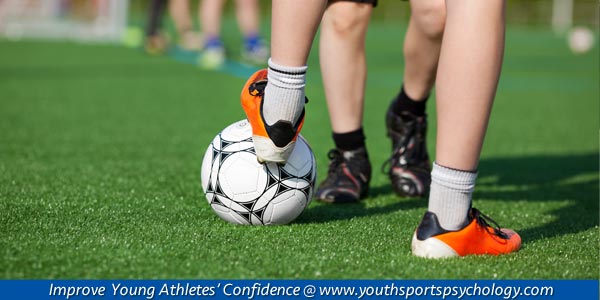
Sports Kids’ Fear of Failure
Too often, kids think they shouldn’t make any mistakes in youth sports. In fact, up to 75% of the kids we work with are hard on themselves after a loss or mistake
When they think they shouldn’t fail, they avoid making mistakes-which is a real mental game no-no.
If kids play to avoid making mistakes or to avoid failure, they stop taking risks.
They play tentatively. They second-guess themselves, rather than just “going for it.” And when they avoid failure, stop taking risks and second-guess themselves, they don’t perform well. They get stuck and don’t learn.
So what should sports parents do?
The trick is to teach young athletes that making mistakes really does benefit them. In fact, they really learn and grow when they make mistakes or fail-if they embrace the right mindset.
Kids need to understand that failure is part of the game. How many golfers win the tournament? Only one our of 144! How many tennis players win a tournament? Only one!
Athletes who respond to adversity in a healthy way and see setbacks as a means to grow rather than a reason to lose confidence and motivation will learn faster and become more successful. That’s in part because they feel confident taking risks.
To help athletes embrace a positive mindset about setbacks, they need to first identify the types of mindsets that can hurt them. Often, kids feel frustrated, angry, try too hard, lose conffidence or give up altogether after setbacks.
Next, help kids understand that making mistakes is part of sports and part of being human. They need to accept this fact. In addition, young athletes should learn how to process their setbacks so they don’t dwell on them. It’s critical to learn how to move on.
After a setback or mistake, kids need to cool down, think about what they did well, and think about what they could learn from their setback. What could they do differently next time? It’s also a great idea to read about athletes who have overcome adversity.
Eager to learn more about how sports kids can transform setbacks into gains? At Kids’ Sports Psychology, exclusive members can download a free ebook, “Growing From Adversity: How to Stay Confident After Failure:”
Growing From Adversity: How to Stay Confident After Failure
What’s more, Kids’ Sports Psychology offers loads of other resources, including audio interviews, videos, articles, Question-and-Answers designed to boost your sports parenting skills and your kids’ confidence and success!
What do folks have to say about our resources?
“I applaud what you’re doing and I’m impressed with your work.”–John Tauer, professor in the Department of Psychology at University of St. Thomas and assistant men’s basketball coach.
Help your sports kids make the most of their talents and enthusiasm for sports!
Sincerely,
Lisa Cohn and Patrick Cohn, Ph.D.
Related Articles on Kids’ Mental Game:
- Helping Young Athletes Kick Perfectionism and Fear of Failure
- Fear of Failure and Youth Sports
- How To Help Young Athletes With Fear of Failure
*Subscribe to The Sports Psychology Podcast on iTunes
*Subscribe to The Sports Psychology Podcast on Spotify
The Composed Sports Kid

“The Composed Sports Kid” audio and workbook digital download program for young athletes and their parents or coach helps kids cope with frustration and anger in sports. Help your sports kids learn how to manage expectations and let go of mistakes so they can keep their head in the game.
The Composed Sports Kid system is really two programs in one–one program to train parents and coaches how to help their kids practice composure, and one program that teaches young athletes–ages 6 to 13–how to improve composure, let go of mistakes quickly, have more self-acceptance, and thus enjoy sports more!
